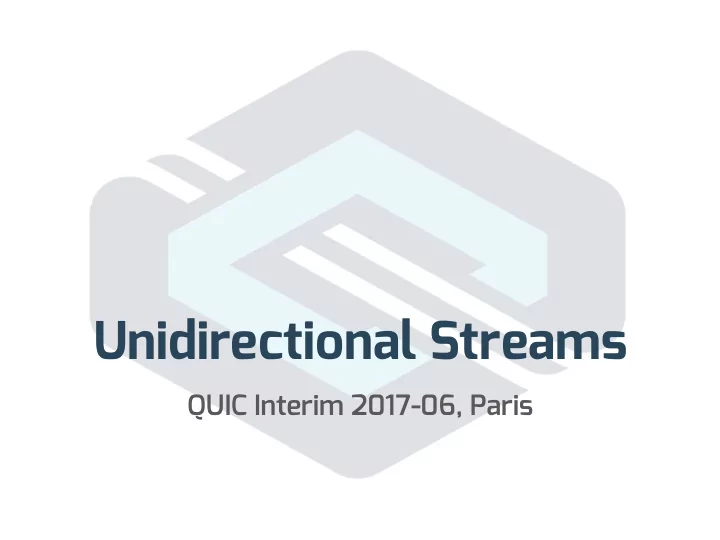

Unidirectional Streams QUIC Interim 2017-06, Paris
Why The transport becomes more generic, simpler A litany of small issues: #515 - the server can’t speak first #281 - HOLB on server push Client has to send empty STREAM+FIN for server push 2
Symmetrical Streams Unidirectionality has an effect on protocols with 1-to-1 mappings between client and server messages … which might seem like it applies to most protocols … except HTTP server push, RTP, CoAP, maybe others 1-to-1 and streams-as-messages don’t always fit The cost is that 1-to-1 protocols need an explicit correlator … stream ID no longer works as implicit correlator 3
#515 After a 1-RTT TLS 1.3 handshake, the server speaks first In HTTP over QUIC, the server could speak first, but stream 1 is a client -initiated stream We could use stream 2, but in 0-RTT the client speaks first Using stream 1 for 0-RTT and stream 2 for 1-RTT is gross 4
#281 Server push operates in two stages: 1. the promise stage where new “requests” are created 2. the fulfilment state where responses are sent In practice, promises are often generated opportunistically … usually as new resources are “discovered” Order of promises doesn’t matter … but fulfilment order is critical to performance 5
#281 cont. If a server promises more than the maximum stream number... A resource that is “discovered” late can be stalled If that resource is urgent, it might take an RTT to sort out Ideally, promises could be fulfilled in any order That requires a layer of indirection... 6
Current State Machine ** or any mention of a Idle higher-numbered stream send/recv STREAM ** Open recv all data send all data recv RST_STREAM send RST_STREAM or RST_STREAM or RST_STREAM Read Write Closed Closed send all data recv all data or RST_STREAM or RST_STREAM Closed 7
Current State Machine ** or any mention of a Idle higher-numbered stream send/recv STREAM ** Open recv all data send all data recv RST_STREAM send RST_STREAM or RST_STREAM or RST_STREAM Read Write Closed Closed send all data recv all data or RST_STREAM or RST_STREAM Closed 8
Simplification Idle (inbound) (outbound) ** or any mention of a recv STREAM ** send STREAM ** higher-numbered stream Open recv all data or RST_STREAM send all data or RST_STREAM Closed 9
HTTP Impact 10
HTTP Mapping Strawman Changes: response streams include the stream ID of the request push streams include the stream ID of the response stream that contained the promise, and a promise index header streams have a flag if there is a body maybe see #557 body streams include the stream ID of the headers need a new control frame to cancel a push 11
Advantages No empty streams No odds/evens for streams … twice as many requests possible … more when requests/responses have no body Push fulfilment in any order Endpoints can send SETTINGS immediately 12
Maybe-Negative Consequences Server push is counted with responses against stream limit server now has to decide which to answer Extra correlators on the start of server streams though probably less was used on empty streams most will be relative, so we can find an efficient encoding 13
Non-Obvious Consequences A client can make more requests than the server can answer With bidirectional streams, client MAX_STREAM_ID governs pushes, which have this exact problem Recommendation: Don’t worry about it, let the server reset requests If it hurts, stop: advertise a larger limit 14
Example (Bidirectional) C S GET / (stream: 9) “” (stream: 11) 200 OK (stream: 9, body: true) PUSH_PROMISE GET /tracker.gif (stream: 9, promise: 18) PUSH_PROMISE GET /index.js (stream: 9, promise 22) “Hello World!” (stream: 11) 200 OK (stream: 22) “window.alert(‘hi’);” (stream: 24) 204 (No Content) (stream: 18) “” (stream: 20) “” (stream: 22), “” (stream 24) “” (stream: 18), “” (stream 20) 15
Example (Unidirectional) C S GET / (stream: 8, body: false) 200 OK (stream: 17, body: true) PUSH_PROMISE GET /tracker.gif (stream: 17, body: false) PUSH_PROMISE GET /index.js (stream: 17) “Hello World!” (stream: 18, response: 17) 200 OK (stream: 19, promise: 17:1) “window.alert(‘hi’);” (stream: 20, response: 19) 204 (No Content) (stream: 21, promise: 17:0) 16
Recommend
More recommend